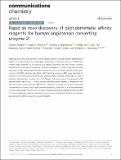Rapid de novo discovery of peptidomimetic affinity reagents for human angiotensin converting enzyme 2
Author(s)
Zhang, Genwei; Brown, Joseph S; Quartararo, Anthony J; Li, Chengxi; Tan, Xuyu; Hanna, Stephanie; Antilla, Sarah; Cowfer, Amanda E; Loas, Andrei; Pentelute, Bradley L; ... Show more Show less
DownloadPublished version (3.775Mb)
Publisher with Creative Commons License
Publisher with Creative Commons License
Creative Commons Attribution
Terms of use
Metadata
Show full item recordAbstract
<jats:title>Abstract</jats:title><jats:p>Rapid discovery and development of serum-stable, selective, and high affinity peptide-based binders to protein targets are challenging. Angiotensin converting enzyme 2 (ACE2) has recently been identified as a cardiovascular disease biomarker and the primary receptor utilized by the severe acute respiratory syndrome coronavirus 2. In this study, we report the discovery of high affinity peptidomimetic binders to ACE2 via affinity selection-mass spectrometry (AS-MS). Multiple high affinity ACE2-binding peptides (ABP) were identified by selection from canonical and noncanonical peptidomimetic libraries containing 200 million members (dissociation constant, <jats:italic>K</jats:italic><jats:sub>D</jats:sub> = 19–123 nM). The most potent noncanonical ACE2 peptide binder, ABP N1 (<jats:italic>K</jats:italic><jats:sub>D</jats:sub> = 19 nM), showed enhanced serum stability in comparison with the most potent canonical binder, ABP C7 (<jats:italic>K</jats:italic><jats:sub>D</jats:sub> = 26 nM). Picomolar to low nanomolar ACE2 concentrations in human serum were detected selectively using ABP N1 in an enzyme-linked immunosorbent assay. The discovery of serum-stable noncanonical peptidomimetics like ABP N1 from a single-pass selection demonstrates the utility of advanced AS-MS for accelerated development of affinity reagents to protein targets.</jats:p>
Date issued
2022-12Department
Massachusetts Institute of Technology. Department of Chemistry; Koch Institute for Integrative Cancer Research at MIT; Massachusetts Institute of Technology. Center for Environmental Health SciencesJournal
Communications Chemistry
Publisher
Springer Science and Business Media LLC
Citation
Zhang, Genwei, Brown, Joseph S, Quartararo, Anthony J, Li, Chengxi, Tan, Xuyu et al. 2022. "Rapid de novo discovery of peptidomimetic affinity reagents for human angiotensin converting enzyme 2." Communications Chemistry, 5 (1).
Version: Final published version